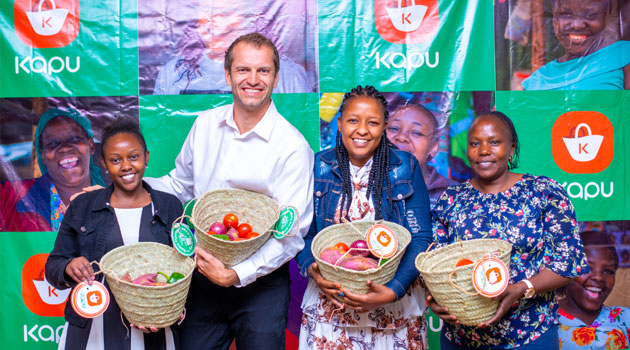Kenyan Social Commerce Startup Kapu, Emerges From Stealth With $8M Funding
With $8 million in venture funding, Kapu, a social commerce business that just came out of stealth, aims to make buying food easier for Kenyan consumers, many of whom are struggling with skyrocketing food prices.
Giant Ventures and Firstminute Capital jointly led the seed round, which also included Founder Collective, Base Capital, Norrsken (co-founder of Klarna Niklas Adalberth’s fund), and Raven One. They join Kapu’s original backers, which also included the co-founders of the Indian startup Meesho and the Brazilian startup Facily, many African family offices, Twitter’s Biz Stone, Supercell’s Ilkka Paananen, Monzo’s Tom Blomfield, and serial entrepreneur Alexander Rittweger.

Sam Endacott, partner at Firstminute Capital, said in a statement: “Sam is deeply experienced in both the e-commerce and logistics category and we are thrilled to partner with him and the entire Kapu team to help alleviate the cost of living crisis on the Continent for consumers, unlock social mobility and drive growth for SMEs in the region.”
Read also : Kenyan Smartphone Re-commerce Startup Badili Lands $2.1M In Pre-seed Funding
A Look At What The Startup Does
Sam Chappatte, the founder of Kapu and a former executive vice president of Jumia Group, claimed that since the company’s launch in January of this year, it has been developing a B2C e-commerce service that allows customers to purchase groceries at lower prices through both online and offline channels.
The firm is currently growing the number of regional representatives with whom customers may place purchases. Soon, WhatsApp orders will be supported as well. Kapu, which facilitates group bulk grocery purchases by sourcing directly from growers and manufacturers, claims to help consumers save 30% on the cost of fresh produce and packaged items.
“People spending like 40 to 50% of their household income on the grocery basket is a big problem for society, but it is also a huge opportunity … The reason we started Kapu is that we think that there is a more relevant model of e-commerce that can be built to target the grocery basket, which is the biggest portion of spend for the vast majority of consumers. And if by using technology we can bring efficiency then we can have a tremendous impact on society for consumers and businesses,” Chappate said.
According to Kapu, there are 1,500 agent collection centres spread out across Nairobi. In its next phase of growth, the company plans to work to fully penetrate Kenya’s capital before pursuing new markets.
Customers place orders with Kapu’s agents, who are typically stationed in residential areas, and deliveries are made the following day.
“Customers receive a notification from Kapu and also from the agents, to go pick up their goods. Many agents also deliver to consumers’ homes,” said Chappate.
The physical channel (via agents) and online direct to consumer (through WhatsApp) formats, according to Kapu, are tailored to the Kenyan market where social commerce is showing promise but e-commerce has not yet taken off.
Read also Winners of ClimaTech Run 2022 Competition Announced at COP27
According to Global Web Index’s 2020 Social Media User Trends Report, Kenya has one of the highest percentages of monthly WhatsApp users in the world. This is occurring as the popularity of the social commerce sector soars in the region as the shift toward online buying follows the Covid pandemic.
Kapu has joined the increasing group of businesses, such as Tushop, which debuted a year ago, that are digitising Kenya’s unorganised retail market. Through agents and WhatsApp, Kapu and Tushop both support group food supply purchases.
Charles Rapulu Udoh

Charles Rapulu Udoh is a Lagos-based lawyer, who has several years of experience working in Africa’s burgeoning tech startup industry. He has closed multi-million dollar deals bordering on venture capital, private equity, intellectual property (trademark, patent or design, etc.), mergers and acquisitions, in countries such as in the Delaware, New York, UK, Singapore, British Virgin Islands, South Africa, Nigeria etc. He’s also a corporate governance and cross-border data privacy and tax expert.
As an award-winning writer and researcher, he is passionate about telling the African startup story, and is one of the continent’s pioneers in this regard. You can book a session and speak with him using the link: https://insightsbyexperts.com/view_expert/charles-rapulu-udoh



